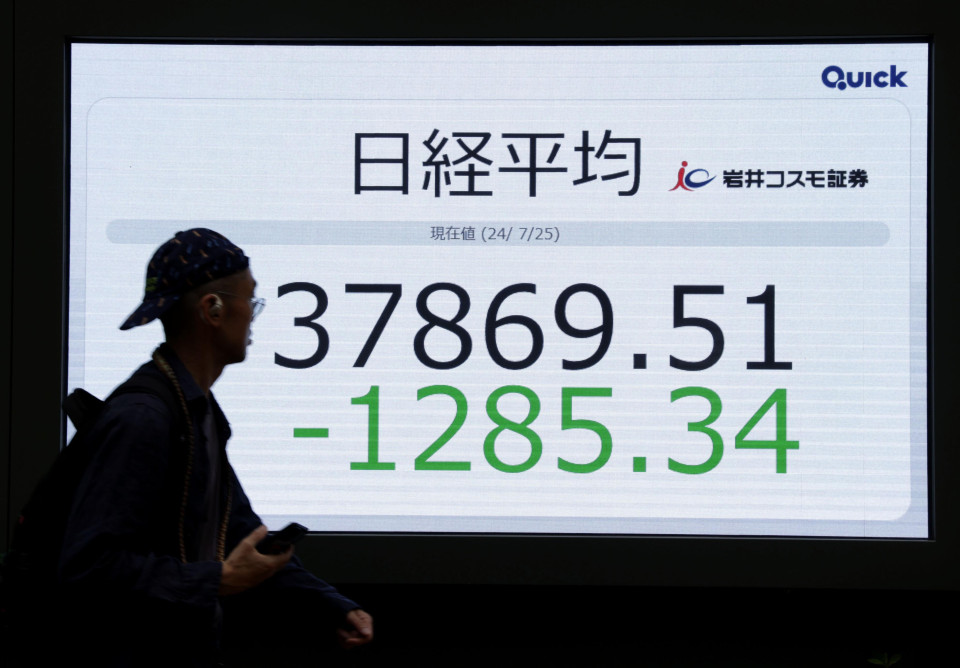The Nikkei stock index on Thursday logged its biggest single-day point fall in eight years and extended its losing streak to seven days, hit by sell-offs of technology issues tracking Wall Street plunges and a stronger yen pressuring exporters.
The 225-issue Nikkei Stock Average ended down 1,285.34 points, or 3.28 percent, from Wednesday at 37,869.51, its lowest closing since April 25 and registering the largest point loss since June 24, 2016. The broader Topix index finished 83.26 points, or 2.98 percent, lower at 2,709.86.
On the top-tier Prime Market, decliners were led by electric appliance, securities house and insurance issues.
The U.S. dollar dropped to as low as 152.06 yen in Tokyo, its lowest level since early May, on yen buying amid speculation the Bank of Japan could raise its benchmark interest rate at its two-day policy meeting starting Tuesday.

The market now sees the odds of the central bank raising interest rates have risen to 50-50 after some heavyweight Japanese ruling party lawmakers made remarks that appeared to urge the BOJ to normalize monetary policy, dealers said.
Recent declines on global equities markets including Japan have also spurred yen buying as a safe-haven asset, they said. The dollar slid by around 5 yen from 157 yen seen Monday.
"Considering the latest stock developments globally, it would be better for the BOJ to forgo a rate hike," said Yukio Ishizuki, senior foreign exchange strategist at Daiwa Securities Co. "But since we don't know what will happen, investors don't feel comfortable selling yen."
At 5 p.m., the dollar fetched 152.18-21 yen compared with 153.80-90 yen in New York and 154.58-60 yen in Tokyo at 5 p.m. Wednesday.
The euro was quoted at $1.0848-0851 and 165.12-16 yen against $1.0834-0844 and 166.83-93 yen in New York and $1.0830-0832 and 167.42-46 yen in Tokyo late Wednesday afternoon.
The yield on the benchmark 10-year Japanese government bond ended at 1.065 percent, down 0.005 percentage point from Wednesday's close. The debt was bought, sending yields higher, after it hit 1.100 percent during trading amid speculation the BOJ could raise rates.
On the stock market, the Nikkei benchmark logged its longest losing streak since October 2021, losing around 10 percent since closing at a record high of 42,224.02 on July 11.
Analysts said the Nikkei is in a correction phase, as the market had been overheated due to rapid advances.
"Profits have been locked in since the record high, with uncertainty over the outcome of the BOJ meeting and who will win the U.S. presidency after President Joe Biden's withdrawal weighing on investor sentiment," said Maki Sawada, strategist in the Investment Content Department of Nomura Securities Co.
Heavyweight tech stocks such as Advantest and SoftBank Group lost ground after U.S. shares were sold widely as the latest earnings from major tech firms fueled concerns that the market had been overly optimistic about prospects for growth in the sector, brokers said.
The yen's sharp appreciation spurred selling of export-oriented auto and electronics issues. Firms with a major overseas presence could face reduced profits from a stronger yen.
Related coverage:
Number of individual shareholders in Japan tops 70 million for first time
Dollar sharply falls to 157 yen range after U.S. CPI data release
Nikkei stock index ends above 42,000 mark for 1st time on tech gains










